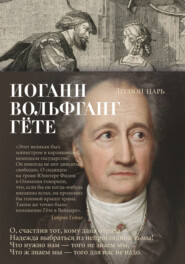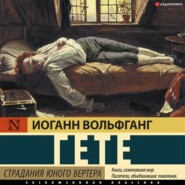По всем вопросам обращайтесь на: info@litportal.ru
(©) 2003-2024.
✖
Wilhelm Meister's Apprenticeship and Travels, Vol. I (of 2)
Настройки чтения
Размер шрифта
Высота строк
Поля
CHAPTER IX
The connection between the baron and the actors had suffered various changes since the arrival of the latter. At the commencement it had been productive of great satisfaction to both parties. As the baron for the first time in his life now saw one of those plays, with which he had already graced a private theatre, put into the hands of real actors, and in the fair way for a decent exhibition, he showed the benignest humor in the world. He was liberal in gifts: he bought little presents for the actresses from every millinery hawker, and contrived to send over many an odd bottle of champagne to the actors. In return for all this, our company took every sort of trouble with his play; and Wilhelm spared no diligence in learning, with extreme correctness, the sublime speeches of that very eminent hero, whose part had fallen to his share.
But, in spite of all these kind reciprocities, some clouds by degrees arose between the players and their patron. The baron's preference for certain actors became daily more observable: this of necessity chagrined the rest. He exalted his favorites quite exclusively, and thus, of course, introduced disunion and jealousy among the company. Melina, without skill to help himself in dubious junctures, felt his situation very vexing. The persons eulogized accepted of their praise, without being singularly thankful for it; while the neglected gentlemen showed traces of their spleen by a thousand methods, and constantly found means to make it very disagreeable for their once much-honored patron to appear among them. Their spite received no little nourishment from a certain poem, by an unknown author, which made a great sensation in the castle. Previously to this the baron's intercourse with the company had given rise to many little strokes of merriment; several stories had been raised about him; certain little incidents, adorned with suitable additions, and presented in the proper light, had been talked of, and made the subject of much bantering and laughter. At last it began to be said that a certain rivalry of trade was arising between him and some of the actors, who also looked upon themselves as writers. The poem we spoke of was founded upon this report: it ran as follows: —
"Lord Baron, I, poor devil, own
With envy, you your rank and state;
Your station, too, so near the throne;
Of heirs your possessions great;
Your father's seat, with walls and mounds,
His game-preserves, and hunting-grounds.
While me, poor devil, it appears,
Lord Baron, you with envy view,
Since Nature, from my early years,
Has held me like a mother true,
With heart and head both light, I poor,
But no poor wight grew, to be sure.
My dear Lord Baron, now to me
It seems, we well alone should let,
That you your father's son still be,
And I remain my mother's pet:
Let's free from envy live, and hate;
Nor let's desire each other's title:
No place you on Parnassus great,
No noble rank I in requital."
My dear Lord Baron, now to me
It seems, we well alone should let,
That you your father's son still be,
And I remain my mother's pet:
Let's free from envy live, and hate;
Nor let's desire each other's title:
No place you on Parnassus great,
No noble rank I in requital."
– Editor's Version.
Upon this poem, which various persons were possessed of, in copies scarcely legible, opinions were exceedingly divided. But who the author was, no one could guess; and, as some began to draw a spiteful mirth from it, our friend expressed himself against it very keenly.
"We Germans," he exclaimed, "deserve to have our Muses still continue in the low contempt wherein they have languished so long; since we cannot value men of rank who take a share in our literature, no matter how! Birth, rank, and fortune are no wise incompatible with genius and taste; as foreign nations, reckoning among their best minds a great number of noblemen, can fully testify. Hitherto, indeed, it has been rare in Germany for men of high station to devote themselves to science; hitherto few famous names have become more famous by their love of art and learning; while many, on the other hand, have mounted out of darkness to distinction, and risen like unknown stars on the horizon. Yet such will not always be the case; and I greatly err, if the first classes of the nation are not even now in the way of also employing their advantages to earn the fairest laurels of the Muses, at no distant date. Nothing, therefore, grieves me more than to see the burgher jeering at the noble who can value literature; nay, even men of rank themselves, with inconsiderate caprice, maliciously scaring off their equal from a path where honor and contentment wait on all."
Apparently this latter observation pointed at the count, of whom Wilhelm had heard that he liked the poem very much. In truth, this nobleman, accustomed to rally the baron in his own peculiar way, was extremely glad of such an opportunity to plague his kinsman more effectually. As to who the writer of the squib might be, each formed his own hypothesis; and the count, never willing that another should surpass him in acuteness, fell upon a thought, which, in a short time, he would have sworn to the truth of. The verses could be written, he believed, by no one but his Pedant, who was a very shrewd knave, and in whom, for a long while, he had noticed some touches of poetic genius. By way of proper treat, he therefore caused the Pedant one morning to be sent for, and made him read the poem, in his own manner, in presence of the countess, the baroness, and Jarno, – a service he was paid for by applauses, praises, and a present; and, on the count's inquiring if he had not still some other poems of an earlier time, he cunningly contrived to evade the question. Thus did the Pedant get invested with the reputation of a poet and a wit, and, in the eyes of the baron's friends, of a pasquinader and a bad-hearted man. From that period, play as he might, the count applauded him with greater zeal than ever; so that the poor wight grew at last inflated till he nearly lost his senses, and began to meditate having a chamber in the castle, like Philina.
Had this project been fulfilled at once, a great mishap might have been spared him. As he was returning late one evening from the castle, groping about in the dark, narrow way, he was suddenly laid hold of, and kept on the spot by some persons, while some others rained a shower of blows upon him, and battered him so stoutly, that in a few seconds he was lying almost dead upon the place, and could not without difficulty crawl in to his companions. These, indignant as they seemed to be at such an outrage, felt their secret joy in the adventure: they could hardly keep from laughing, at seeing him so thoroughly curried, and his new brown coat bedusted through and through, and bedaubed with white, as if he had had to do with millers.
The count, who soon got notice of the business, broke into a boundless rage. He treated this act as the most heinous crime, called it an infringement of the Burgfried, or peace of the castle, and caused his judge to make the strictest inquisition touching it. The whited coat, it was imagined, would afford a leading proof. Every creature that possibly could have the smallest trade with flour or powder in the castle was submitted to investigation, but in vain.
The baron solemnly protested on his honor, that although this sort of jesting had considerably displeased him, and the conduct of his lordship the count had not been the friendliest, yet he had got over the affair; and with respect to the misfortune which had come upon the poet, or pasquinader, or whatsoever his title might be, he knew absolutely nothing, and had not the most remote concern in it.
The operations of the strangers, and the general commotion of the house, soon effaced all recollection of the matter; and so, without redress, the unlucky favorite had to pay dear for the satisfaction of pluming himself, a short while, in feathers not his own.
Our troop, regularly acting every night, and on the whole very decently treated, now began to make more clamorous demands, the better they were dealt with. Erelong their victuals, drink, attendance, lodging, grew inadequate; and they called upon the baron, their protector, to provide more liberally for them, and at last make good those promises of comfortable entertainment, which he had been giving them so long. Their complaints grew louder, and the efforts of our friend to still them more and more abortive.
Meanwhile, excepting in rehearsals and hours of acting, Wilhelm scarcely ever came abroad. Shut up in one of the remotest chambers, to which Mignon and the harper alone had free access, he lived and moved in the Shakspearian world, feeling or knowing nothing but the movements of his own mind.
We have heard of some enchanter summoning, by magic formulas, a vast multitude of spiritual shapes into his cell. The conjurations are so powerful that the whole space of the apartment is quickly full; and the spirits, crowding on to the verge of the little circle which they must not pass, around this, and above the master's head, keep increasing in number, and ever whirling in perpetual transformation. Every corner is crammed, every crevice is possessed. Embryos expand themselves, and giant-forms contract into the size of nuts. Unhappily the black-artist has forgot the counterword, with which he might command this flood of sprites again to ebb.
So sat Wilhelm in his privacy: with unknown movements, a thousand feelings and capacities awoke in him, of which he formerly had neither notion nor anticipation. Nothing could allure him from this state: he was vexed and restless if any one presumed to come to him, and talk of news or what was passing in the world.
Accordingly, he scarce took notice of the circumstance, when told that a judicial sentence was about being executed in the castle-yard, – the flogging of a boy, who had incurred suspicions of nocturnal housebreaking, and who, as he wore a peruke-maker's coat, had most probably been one of the assaulters of the Pedant. The boy indeed, it seemed, denied most obstinately; so that they could not inflict a formal punishment, but meant to give him a slight memorial as a vagabond, and send him about his business; he having prowled about the neighborhood for several days, lain at night in the mills, and at last clapped a ladder to the garden-wall, and mounted over by it.
Our friend saw nothing very strange in the transaction, and was dismissing it altogether, when Mignon came running in, and assured him that the criminal was Friedrich, who, since the rencounter with the Stallmeister, had vanished from the company, and not again been heard of.
Feeling an interest in the boy, Wilhelm hastily arose: he found, in the court-yard of the castle, the preparations almost finished. The count loved solemnity on these occasions. The boy being now led out, our friend stepped forward, and entreated for delay, as he knew the boy, and had various things to say which might, perhaps, throw light on the affair. He had difficulty in succeeding, notwithstanding all his statements: at length, however, he did get permission to speak with the culprit in private. Friedrich averred, that, concerning the assault in which the Pedant had been used so harshly, he knew nothing whatever. He had merely been lurking about, and had come in at night to see Philina, whose room he had discovered, and would certainly have reached, had he not been taken by the way.
For the credit of the company, Wilhelm felt desirous not to have the truth of his adventure published. He hastened to the Stallmeister: he begged him to show favor, and, with his intimate knowledge of men and things about the castle, to find some means of quashing the affair, and dismissing the boy.
This whimsical gentleman, by Wilhelm's help, invented a little story, – how the boy had belonged to the troop, had run away from it, but soon wished to get back, and be received again into his place; how he had accordingly been trying in the night to come at certain of his well-wishers, and solicit their assistance. It was testified by others that his former behavior had been good: the ladies put their hands to the work, and Friedrich was let go.
Wilhelm took him in, – a third person in that strange family, which for some time he had looked on as his own. The old man and little Mignon received the returning wanderer kindly; and all the three combined to serve their friend and guardian with attention, and procure him all the pleasure in their power.
CHAPTER X
Philina now succeeded in insinuating farther every day into the favor of the ladies. Whenever they were by themselves, she was wont to lead the conversation on the men whom they saw about the castle; and our friend was not the last or least important that engaged them. The cunning girl was well aware that he had made a deep impression on the countess: she therefore talked about him often, telling much that she knew or did not know, only taking care to speak of nothing that might be interpreted against him; eulogizing, on the contrary, his nobleness of mind, his generosity, and, more than all, his modest and respectful conduct to the fair sex. To all inquiries made about him she replied with equal prudence; and the baroness, when she observed the growing inclination of her amiable friend, was likewise very glad at the discovery. Her own intrigues with several men, especially of late with Jarno, had not remained hidden from the countess, whose pure soul could not look upon such levities without disapprobation, and meek, though earnest, censures.
In this way both Philina and the baroness were personally interested in establishing a closer intercourse between the countess and our friend. Philina hoped, moreover, that there would occur some opportunity when she might once more labor for herself, and, if possible, get back the favor of the young man she had lost.
One day his lordship, with his guests, had ridden out to hunt; and their return was not expected till the morrow. On this the baroness devised a frolic, which was altogether in her way, for she loved disguises, and, in order to surprise her friends, would suddenly appear among them as a peasant-girl at one time, at another as a page, at another as a hunter's boy. By which means she almost gave herself the air of a little fairy, that is present everywhere, and exactly in the place where it is least expected. Nothing could exceed this lady's joy, if, without being recognized, she could contrive to wait upon the company for some time as a servant, or mix among them anyhow, and then at last in some sportful way disclose herself.
Towards night she sent for Wilhelm to her chamber, and, happening to have something else to do just then, left Philina to receive and prepare him.
He arrived, and found to his surprise, not the honorable lady, but the giddy girl, in the room. She received him with a certain dignified openness of manner, which she had of late been practising, and so constrained him likewise to be courteous.
At first she rallied him in general on the good fortune which pursued him everywhere, and which, as she could not but see, had led him hither in the present case. Then she delicately set before him the treatment with which of late he had afflicted her; she blamed and upbraided herself; confessed that she had but too well deserved such punishment; described with the greatest candor what she called her former situation; adding, that she would despise herself, if she were not capable of altering, and making herself worthy of his friendship.
Wilhelm was struck with this oration. He had too little knowledge of the world to understand that persons quite unstable, and incapable of all improvement, frequently accuse themselves in the bitterest manner, confessing and deploring their faults with extreme ingenuousness, though they possess not the smallest power within them to retire from that course, along which the irresistible tendency of their nature is dragging them forward. Accordingly, he could not find in his heart to behave inexorably to the graceful sinner: he entered into conversation, and learned from her the project of a singular disguisement, wherewith it was intended to surprise the countess.
He found some room for hesitation here, nor did he hide his scruples from Philina: but the baroness, entering at this moment, left him not an instant for reflection; she hurried him away with her, declaring it was just the proper hour.
It was now grown dark. She took him to the count's wardrobe, made him change his own coat with his lordship's silk night-gown, and put the cap with red trimmings on his head. She then led him forward to the cabinet; and bidding him sit down upon the large chair, and take a book, she lit the Argand lamp which stood before him, and showed him what he was to do, and what kind of part he had to play.
They would inform the countess, she said, of her husband's unexpected arrival, and that he was in very bad humor. The countess would come in, walk up and down the room once or twice, then place herself beside the back of his chair, lay her arm upon his shoulder, and speak a few words. He was to play the cross husband as long and as well as possible; and, when obliged to disclose himself, he must behave politely, handsomely, and gallantly.
Wilhelm was left sitting, restlessly enough, in this singular mask. The proposal had come upon him by surprise: the execution of it got the start of the deliberation. The baroness had vanished from the room, before he saw how dangerous the post was which he had engaged to fill. He could not deny that the beauty, the youth, the gracefulness, of the countess had made some impression on him: but his nature was entirely averse to all empty gallantry, and his principles forbade any thought of more serious enterprises; so that his perplexity at this moment was in truth extreme. The fear of displeasing the countess, and that of pleasing her too well, were equally busy in his mind.
Every female charm that had ever acted on him, now showed itself again to his imagination. Mariana rose before him in her white morning-gown, and entreated his remembrance. Philina's loveliness, her beautiful hair, her insinuating blandishments, had again become attractive by her late presence. Yet all this retired as if behind the veil of distance, when he figured to himself the noble, blooming countess, whose arm in a few minutes he would feel upon his neck, whose innocent caresses he was there to answer.

















